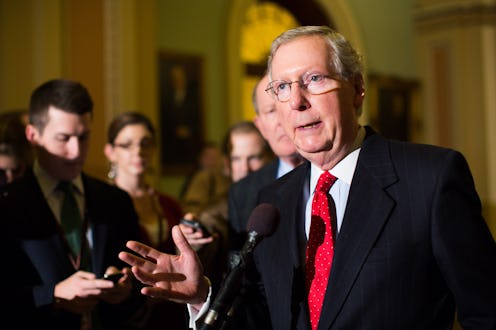News
4 Immediate Effects of The Filibuster Vote
The filibuster has been, well, busted. Although the filibuster can still be used in some circumstances, the minority can no longer talk for hours on end to keep the Senate from voting on the confirmation of judicial or executive-branch nominees. The change was approved by a vote of 52 to 48 shortly on Thursday, much to Republicans’ dismay. (Lest all the Senate's entertainment value be quashed, members can still filibuster Supreme Court nominees and regular bills.) The effects of yesterday's decision will no doubt have a ripple effect, impacting all kinds of government business. Some of those changes will be felt sooner rather than later. Here's where we can expect immediate effects:
D.C. Court of Appeals
This battle started it all. It was after three consecutive picks for the court were filibustered that Sen. Harry Reid finally invoked the "nuclear option," enforcing a simple-majority vote instead of the usual 60 required to end a filibuster. The first filibuster ended by the new rules was also a nominee for D.C.'s highest (regional) court. But why are nominations to a court less than supreme so contentious?
A few reasons: the court is currently balanced between Democrats and Republicans (it's four and four right now, with three vacancies), and since it covers the area where most federal agencies are located, it rules on an unusually large number of cases that end up affecting policy. New nominees could help push policy in the direction the president wants it on everything from environmental issues to the Affordable Care Act (again).
Department of Homeland Security
Yesterday's vote also closed debate on Jeh Johnson, the nominee to head up DHS. His confirmation passed through the Senate, but not without some reservations: John McCain has said he's refraining from supporting the nomination until Johnson promises to give "exact metrics" on his plan for border protection. Still others have reservations about Johnson's role in the targeted killing program at the Department of Defense, where he served as general counsel.
Federal Housing Finance Agency
You've probably never heard of this one. Don't worry; it only controls the bulk of the country's housing market. The agency regulates the housing giants Fannie Mae and Freddie Mac, which, among other things, control who can get a home loan and how much they qualify for. If confirmed, Obama nominee Mel Watt would probably make credit available to more aspiring homeowners by offering more of it. He would also likely have FHFA refinance mortgages at lower rates.
Federal Reserve
Although Janet Yellen's confirmation as Chairman of the Fed is pretty much assured at this point, there are several more spots on the bank's governing committee that the president still needs to fill. This is another realm where partisanship matters: while Democratic legislators tend to believe the best way to manage the economy is to stimulate it, Republican lawmakers are more likely to fall on the side of inflation as a way to keep things going. While traditionally the White House has tried to keep a good balance between the two groups, that's no longer a political obligation. We'll see where this one goes.
